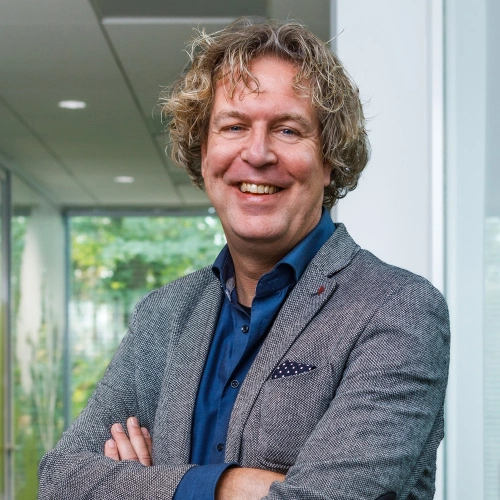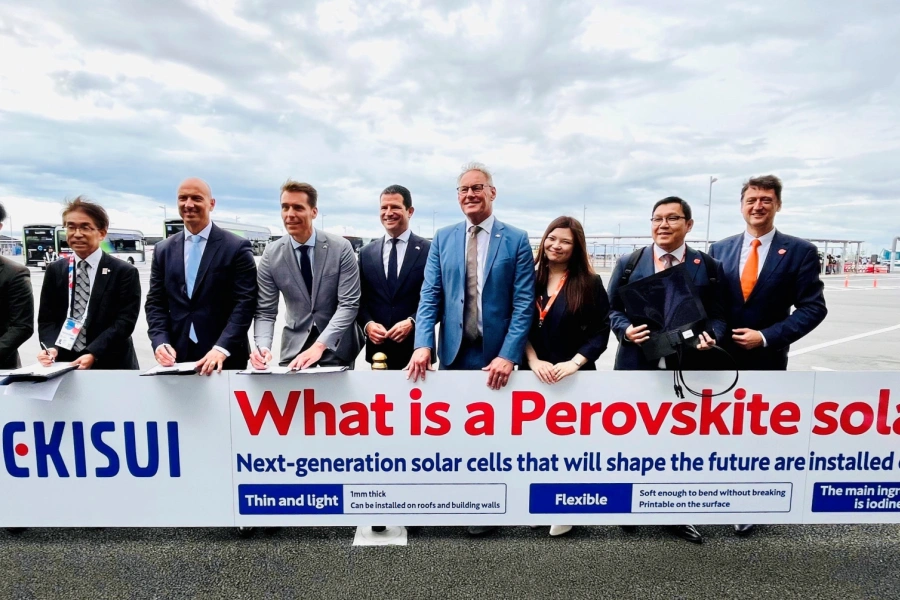Brabant Development Agency (BOM), TNO and Sekisui Solar Film Co from Japan have initiated exploratory talks on collaboration around flexible perovskite solar modules. On Wednesday, May 21, in Osaka, Japan, a letter of intent was signed by Takeharu Morito (Sekisui), Tjark Tjin-A-Tsoi (TNO), and Daan de Cloe (BOM).
Sekisui Solar Film specializes in the development and production of ultra-thin perovskite solar modules. These modules are lightweight, flexible, and can be produced in a circular manner. They can be directly integrated into façades, windows, and roofs, for example.
The benefits of perovskite modules need little explanation for many companies and knowledge institutions in Brabant. Over the years, a strong coalition has emerged in the province focused on the development of this type of solar technology.
Within that ecosystem, Brabant-based partners—under BOM’s leadership—are working on optimizing module functionality, improving and lowering the cost of materials, developing effective production machinery, and setting up demonstration projects.
Recently, the Innovation Coalition Solar (IC Solar) expressed the ambition to realize large-scale production of perovskite modules in Brabant. The letter of intent between BOM, TNO, and Sekisui may bring that ambition one step closer to reality.
Edo de Ronde and Kahoru Nagatani of the Netherlands Foreign Investment Agency (NFIA) in Japan laid the foundation for the connection between BOM, TNO, and Sekisui Solar Film, enabling the start of exploratory discussions.
With the signing of the letter of intent, the involved parties indicate their shared ambition to initiate talks about a potential perovskite module factory in Brabant and to exchange relevant information on the subject.
Takeharu Morito, General Manager of Technology & Development at Sekisui Solar Film Co, stated: 'We look forward to a fruitful collaboration with the Dutch and Brabant ecosystems.'
Daan de Cloe, Managing Director Foreign Investments & International Trade at BOM, added: 'With this signing, we underline the structural collaboration in knowledge and business between Japan and Brabant. TNO, Sekisui, and BOM are jointly driving this new solar innovation forward. Through this partnership, they can achieve a world-leading position in the production of perovskite modules.'
Learn more

A successful energy transition requires more than just traditional solar modules. Perovskite modules, for example, can be applied to façades and roofs with limited load-bearing capacity—areas where traditional modules are not viable. As a result, the net surface area available for solar energy generation can increase significantly with the advent of perovskite modules.
At the national level, there is also strong confidence in the potential of perovskite technology. Previously, €320 million was awarded from the National Growth Fund to SolarNL for the development of a new generation of solar modules. SolarNL’s ambition is to establish a robust industry in the Netherlands centered on solar module production.
'This letter of intent is an important step toward greater synergy between the Dutch and Japanese programs in the field of flexible solar energy technologies,' says Tjark Tjin-A-Tsoi, CEO of TNO. 'and for TNO to help strengthen the regional manufacturing industry by exploring partnership with Sekisui to enable roll-to-roll perovskite solar production in the Netherlands.'
Japan sees the Netherlands as a reliable partner in advancing perovskite module research and development—and in quickly scaling up production. Sekisui is a logical partner in this context: the company is well-acquainted with the opportunities presented by the Dutch open innovation ecosystem. A sister company of Sekisui (SEKISUI CHEMICAL CO.) is already established at the Automotive Campus in Helmond.
Sekisui Solar Film Co is a valuable addition to the existing Brabant ecosystem, and can play a significant role in further developing materials and technologies. The ultimate goal remains clear: achieving large-scale production of flexible perovskite modules in both the Netherlands and Japan.
